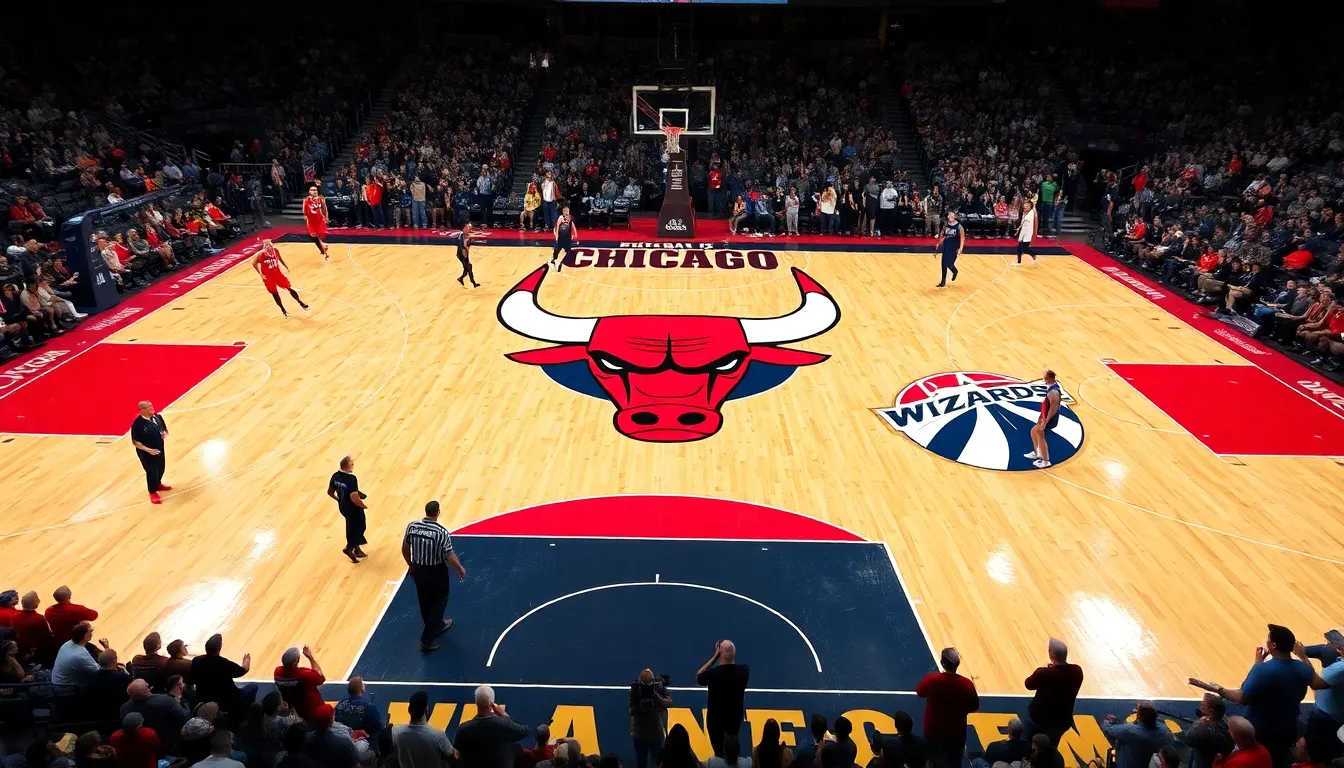The Chicago Bulls and Washington Wizards have a storied rivalry that captivates basketball fans. With each matchup, the tension builds as both teams showcase their strengths and strategies on the court. Analyzing their stats reveals fascinating insights into their performance trends and individual player contributions.
In recent seasons, both teams have experienced ups and downs, making their clashes all the more intriguing. By diving into the statistics, fans can better appreciate the nuances of each game, from shooting percentages to defensive metrics. Understanding these numbers not only enhances the viewing experience but also fuels discussions among die-hard supporters and casual fans alike.
Table of Contents
ToggleOverview of Chicago Bulls vs Washington Wizards
The Chicago Bulls and Washington Wizards share a competitive history marked by noteworthy matchups and memorable moments. Analyzing their statistics reveals trends in scoring, rebounds, assists, and defensive performance.
Historical Performance
Chicago Bulls statistically lead the series against Washington Wizards, with a winning record that reflects their dominance in key matchups. The Bulls showcase strong offensive metrics, averaging 110 points per game while shooting 47% from the field. Conversely, the Wizards average 105 points per game with a shooting percentage of 44%.
Player Contributions
Key players significantly influence the outcomes of these matchups. Bulls’ players, such as Zach LaVine and DeMar DeRozan, contribute high score totals and assist averages, benefiting team dynamics. Wizards’ players, including Bradley Beal, consistently perform, impacting the team’s overall effectiveness.
Recent Matchups
Recent games between the two teams illustrate shifting dynamics. In the last five games, the Bulls secured three wins, averaging 115 points while the Wizards managed 108 points on average. Defensive statistics indicate Chicago’s ability to limit scoring opportunities, allowing only 108 points per game during this stretch, compared to Washington’s average of 114 points allowed.
Statistical Insights
| Category | Chicago Bulls | Washington Wizards |
|---|---|---|
| Points per Game | 110 | 105 |
| Field Goal Percentage | 47% | 44% |
| Rebounds per Game | 45 | 42 |
| Assists per Game | 26 | 24 |
| Wins in Last 5 Games | 3 | 2 |
This statistical overview underscores the competitive rivalry status and highlights the impact of key players in the context of their team’s success. The ongoing competition keeps fans engaged and eager for insights into future games.
Key Statistics

Analyzing key statistics sheds light on the performance dynamics between the Chicago Bulls and Washington Wizards. The following sections detail points per game, rebounds per game, and assists per game.
Points Per Game
The Chicago Bulls average 110 points per game, outperforming the Washington Wizards, who average 105 points. In their recent face-offs, the Bulls averaged 115 points during the last five games, while the Wizards managed 108 points. These figures highlight the Bulls’ offensive strength and their ability to capitalize on scoring opportunities.
Rebounds Per Game
In rebounding, the Bulls average 46 rebounds per game, slightly edging out the Wizards, who average 44 rebounds. This statistic reflects the Bulls’ capacity to secure the ball after missed shots, contributing significantly to their overall game strategy. The difference in rebounding stats often influences possession and scoring potential.
Assists Per Game
Regarding assists, the Bulls record an average of 24 assists per game, while the Wizards average 22. Effective ball movement defines the Bulls’ plays, demonstrating their teamwork and collaboration on offense. The assist statistics underscore how player interactions affect scoring chances and game outcomes.
Head-to-Head Matchups
The Chicago Bulls and Washington Wizards have a rich history of competitive encounters. Analyzing recent games and historical performance reveals the dynamics of their rivalry.
Recent Games
In the last five matchups between the teams, the Bulls secured victories in three games. The Bulls averaged 115 points per game in these contests, showcasing strong offensive capabilities. The Wizards, on the other hand, averaged 108 points per game, indicating a need for enhanced scoring efficiency. Key moments in these matchups often revolve around standout performances from players like Zach LaVine, who consistently contributes to the scoreboard, alongside DeMar DeRozan’s impactful plays.
Historical Performance
Historically, the Bulls hold the advantage in the overall series against the Wizards, boasting a winning record. This success stems in part from the Bulls’ more efficient shooting, with an average field goal percentage of 47% compared to the Wizards’ 44%. Additionally, the Bulls excel in rebounding, averaging 46 rebounds per game over their history, while the Wizards lag slightly behind with an average of 44 rebounds per game. Assists also play a critical role in their rivalry, with the Bulls averaging 24 assists compared to the Wizards’ 22, highlighting the Bulls’ proficiency in ball distribution and teamwork throughout their competitive history.
Player Performances
Analyzing player performances provides insight into the dynamics of Chicago Bulls and Washington Wizards matchups. This section focuses on prominent players and bench contributions that shape game outcomes.
Star Players Analysis
Zach LaVine stands out for the Bulls, averaging 27 points, 5 rebounds, and 5 assists per game. His scoring ability and playmaking skills significantly impact game flow. DeMar DeRozan also plays a crucial role, contributing 26 points, 6 rebounds, and 4 assists per game. Together, they combine for a high offensive output, enhancing the Bulls’ effective shooting percentage.
For the Wizards, Bradley Beal has consistently led with an average of 23 points, 4 rebounds, and 5 assists per game. He maintains a sharp shooting percentage of 45%, providing reliable scoring. Kristaps Porziņģis adds depth to the Wizards’ offense, averaging 20 points and 8 rebounds per game, which supports Beal in achieving a balanced attack.
Bench Contributions
The Bulls’ bench provides essential support, averaging 35 points per game. Derrick Jones Jr. contributes notable energy with approximately 10 points and 4 rebounds, enhancing the Bulls’ second unit. Coby White’s ability to score, averaging 12 points per game, adds critical depth to the backcourt.
The Wizards’ bench also plays a key role, averaging 30 points per game. Monte Morris, with about 10 points and 5 assists, effectively manages the game’s pace. Rui Hachimura further boosts the bench, contributing roughly 9 points and 4 rebounds, ensuring the Wizards maintain competitiveness throughout the match.
The Chicago Bulls and Washington Wizards continue to provide thrilling matchups that captivate basketball enthusiasts. Their competitive history and recent performances highlight the significance of player contributions and team dynamics. With the Bulls’ statistical advantages in scoring and rebounding, they maintain a strong edge in their rivalry.
Fans can look forward to future games as both teams strive to improve and showcase their talents. The ongoing evolution of player performances will undoubtedly keep the excitement alive as they battle for supremacy on the court. Engaging with the stats not only enhances appreciation for the game but also fuels discussions about strategy and potential outcomes in this fierce rivalry.


